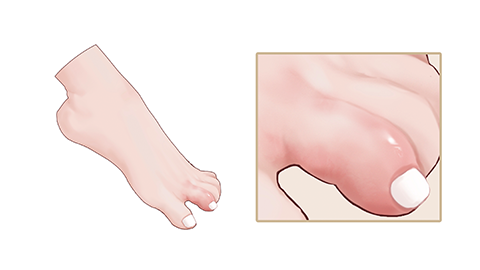What causes pain in the toes?
Toe pain may be caused by ill-fitting shoes, sports injuries, prolonged standing or walking, paronychia, or gouty arthritis. Appropriate measures can be taken according to the specific cause. If discomfort occurs, it is recommended to seek timely medical consultation to clarify the condition and receive treatment according to medical advice, so as to avoid delaying the progression of the disease.

1. Ill-fitting shoes: Wearing shoes that are too tight, small, or stiff can compress and rub the toes, leading to poor local blood circulation and resulting in pain. Choose shoes with appropriate size, loose and comfortable fit, and soft, elastic soles to allow sufficient space for toe movement. Avoid wearing high heels or pointed-toe shoes for prolonged periods to reduce pressure on the toes and alleviate pain.
2. Sports injuries: During physical activities such as running or jumping, incorrect posture or sudden high-intensity exercise may cause sprains or strains of the toes. Adequate warm-up exercises, including ankle and toe joint movements, should be performed before exercising. Apply cold compresses within 72 hours after injury, and switch to warm compresses after 72 hours.
3. Prolonged standing or walking: Extended periods of standing or walking can place significant pressure on the toes, causing muscle fatigue and accumulation of local metabolic byproducts, which may lead to pain. Take appropriate rest breaks during work, soak feet in warm water before bedtime to relax foot muscles. Foot massage can also be performed, gently massaging from the toes toward the heel to relieve pain.
4. Paronychia: Improper nail trimming, puncture wounds, or peeling off of cuticles may lead to bacterial infection in the nail fold area, causing inflammation. Symptoms include redness, swelling, and pain in the toe nail fold area, with possible pus formation in severe cases. Patients may use antiseptic solutions such as povidone-iodine, mupirocin ointment, amoxicillin capsules, and other medications under medical guidance to improve symptoms.
5. Gouty arthritis: Disorders of purine metabolism in the body can elevate blood uric acid levels, causing urate crystals to deposit in the toe joints, potentially triggering inflammation and pain. This condition often suddenly occurs at night, with severe pain, redness, swelling, and warmth in the joint. Patients may take medications such as colchicine tablets, allopurinol tablets, and febuxostat tablets as directed by a physician to relieve discomfort.
In daily life, it is recommended to rest adequately, maintain a light diet, and ensure balanced nutrition, which helps promote recovery.







